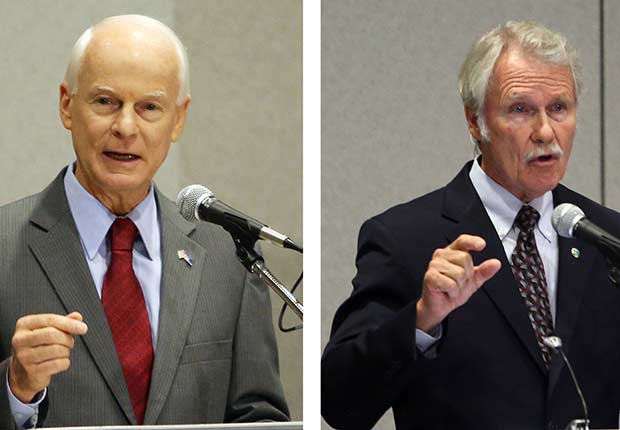AARP Hearing Center

By Dan Hortsch
Whoever wins the election for governor on Nov. 4 will make Oregon political history.
Gov. John Kitzhaber, 67, the Democratic incumbent and former emergency room physician from Roseburg, is already serving an unprecedented third term in Salem. Now he’s trying for a fourth.
Republican Dennis Richardson, 65, a state representative from Central Point, is serving his sixth two-year term in the Oregon House. He is campaigning to be the first GOP governor in 28 years.
Older voters have a major stake in this election. Issues include retirement income and how to use revenue from a reduced medical expense tax deduction affecting residents 62 and older.
AARP Oregon is also concerned about ways to help older people find employment if needed, “age in place” in their homes, and have access to services such as in-home care that help them maintain their independence.
Each campaign responded to the AARP Bulletin by email.
- Retirement savings. In 2013 the Legislature created the Oregon Retirement Savings Task Force to explore ways to help workers in the private sector save for retirement. Nearly half of Oregonians are not covered by a retirement plan at work, said Jerry Cohen, AARP Oregon state director.
Kitzhaber, who signed the bill creating the savings task force, supports allowing employee contributions to a “state-managed, optional retirement plan” similar to a college savings plan. Changes in labor mobility, he said, mean that “our retirement savings practices ... and policies need to further evolve to reflect this change.”
Richardson, who voted against the legislation, said that it began as “one of the most dangerous bills” in the session before it was reduced to a task force proposal. “The intent was to create a government mandated retirement program that employers were forced to participate in that would be managed by the state.” The task force still could produce such a plan, which Richardson calls “a terrible idea.”
- Medical tax deduction. The Legislature last year decided that taxpayers age 62 and older no longer can deduct medical expenses for an entire household, regardless of age. A more limited deduction, for those 62 and over only, took its place. That left the issue of how much of the increased revenue should be spent on programs for the older population.
During this year’s session, the Legislature allocated $13.3 million of the $26 million in new revenue to senior and disabled transit, long-term care provider training and public guardian and conservator support. Kitzhaber, who signed the bill, said he expects the rest of that money, set aside for now, to strengthen support services, and that additional resources in the future will cover such services.
Richardson opposed the medical expense changes as “unfair adjustments to medical deductions” for older people. If the state continues to take away part of the medical deduction, “then we need to spend [that revenue] on programs that directly benefit them,” including mental health, caregiver training and special needs.
He wants current increased revenue devoted to such support and is concerned that future legislative sessions might not continue some funding.
- Livable communities. Kitzhaber said he reinvigorated the Governor’s Commission on Senior Services in 2011 to explore such issues. Helping seniors stay in their homes, he said, “is both cost-effective policy and the right thing to do.”
Richardson said the growth rate of the older population will stretch social resources “like never before” and cited the importance of Oregon Project Independence, which supports people staying in their homes.
For more information on state and federal candidates’ positions, go to the voter guide at aarp.org/yourvote. AARP does not endorse candidates, contribute to campaigns or favor political parties.
Dan Hortsch is a writer living in Portland.































































